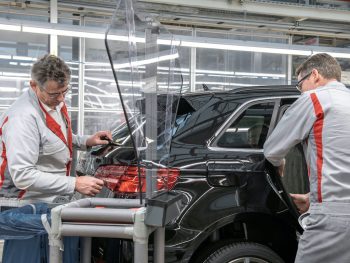Further automotive disruption to come, says Grant Thornton
The ongoing conflict in Ukraine will have repercussions throughout the automotive market for years to come.

Material shortages as a result of the conflict will impact production
That’s according to professional services giant Grant Thornton in the latest issue of Cox Automotive’s AutoFocus insight publication.
Owen Edwards, head of downstream automotive at Grant Thornton, highlighted the substantial part Russia and Ukraine both play in the European and global automotive ecosystems.
“Both Russia and Ukraine operate 34 and seven automotive assembly and production plants respectively, where passenger cars, light commercial vehicles, heavy-duty vehicles, buses, and engines are produced. Much of the vehicle production is for their own domestic markets, but for OEMs that export to these countries, a direct impact will be felt from halted production in Russia.”
For countries in the West, Edwards added that some of the largest effects of the conflict will be an impact on the supply chain, which ranges from raw materials to sales and operations. Raw materials shortages include gases and microchip production, palladium and platinum, wire harnesses, aluminium and cobalt.
Edwards added: “The much-discussed semiconductor chip shortages, which have badly affected the automotive industry in the past year, are further impacted by the conflict. 50% of the world’s output of neon and 40% of the world’s krypton, which are needed to manufacture semiconductor chips, comes from Ukraine.
“Russia is the primary supplier of palladium, which is used for catalytic converters to meet emissions requirements. In addition, Ukraine produces a large number of wiring harnesses, which are used in car production. The German car industry, in particular, will be affected badly by both these materials shortages. Meanwhile, Russia (outside of China) plays a large part in aluminium supply. Shortages of this metal are expected in the coming months, which will drive up the price of raw materials.”
And Edwards said electric car production could also be affected by shortages in cobalt production. In 2021, Russia was the second-largest producer of cobalt, which is used as a component of lithium-ion batteries.
While Grant Thornton previously anticipated that normal new vehicle production levels could return by the end of 2022/early 2023 as the semiconductor shortage eases, this now appears unlikely.
The conflict in Ukraine will also influence raw material prices, which will continue to rise and will likely need to be passed onto consumers, at least in part, at a time when the West is grappling with a cost-of-living crisis, further weakening consumer confidence.
The outlook for the used car market also remains uncertain.
Edwards added: “The prices of used cars are expected to remain above pre-Covid levels, but whether they remain at the high levels seen at the end of 2021 will depend on whether demand weakens.”
Philip Nothard, insight and strategy director, Cox Automotive, said the used car industry should prepare for further impact as market supply becomes even more constrained.
“The past five years have proven that the automotive industry can adapt well to significant turmoil. The investment in battery electric vehicles (BEVs) by OEMs and Tier 1-4 parts suppliers is paying off, as consumers have started to change their purchasing habits. According to the Society of Motor Manufacturers and Traders (SMMT), BEVs accounted for around 18% of all new vehicles sold in February 2022. In addition, while dealer groups have continued to perform well with robust earnings results, in many cases, the Plc companies have provided trading upgrades to earnings.”
To view the latest issue of Cox Automotive’s AutoFocus digital magazine, click here.

















